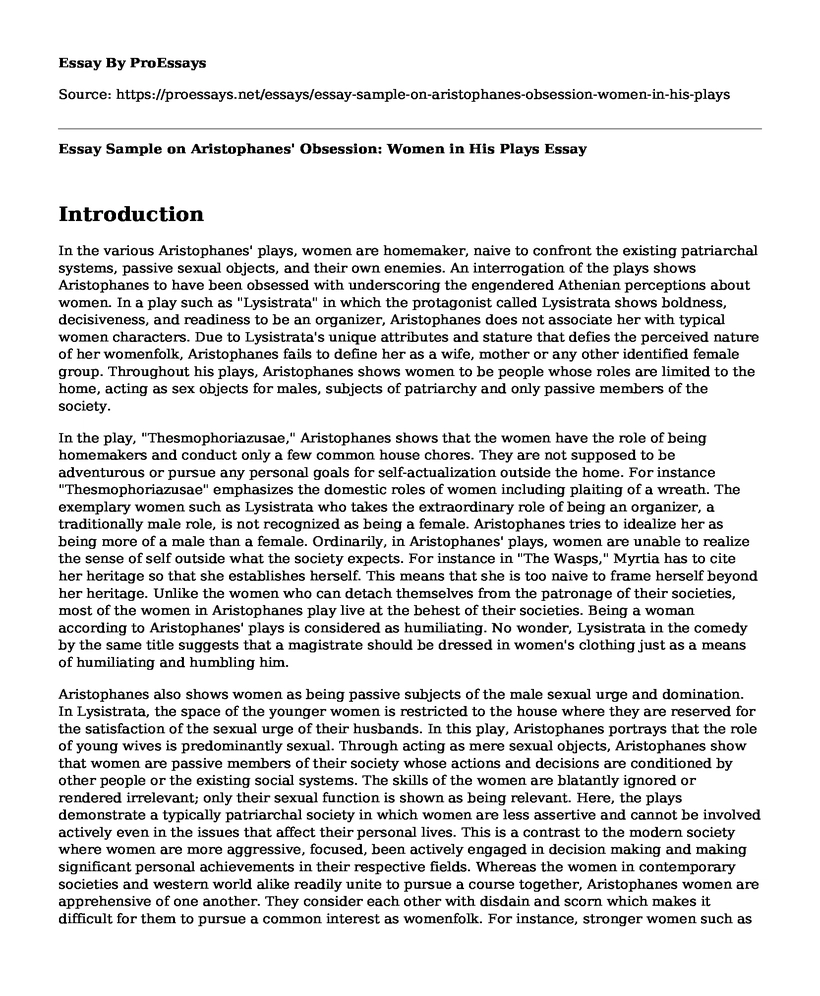Introduction
In the various Aristophanes' plays, women are homemaker, naive to confront the existing patriarchal systems, passive sexual objects, and their own enemies. An interrogation of the plays shows Aristophanes to have been obsessed with underscoring the engendered Athenian perceptions about women. In a play such as "Lysistrata" in which the protagonist called Lysistrata shows boldness, decisiveness, and readiness to be an organizer, Aristophanes does not associate her with typical women characters. Due to Lysistrata's unique attributes and stature that defies the perceived nature of her womenfolk, Aristophanes fails to define her as a wife, mother or any other identified female group. Throughout his plays, Aristophanes shows women to be people whose roles are limited to the home, acting as sex objects for males, subjects of patriarchy and only passive members of the society.
In the play, "Thesmophoriazusae," Aristophanes shows that the women have the role of being homemakers and conduct only a few common house chores. They are not supposed to be adventurous or pursue any personal goals for self-actualization outside the home. For instance "Thesmophoriazusae" emphasizes the domestic roles of women including plaiting of a wreath. The exemplary women such as Lysistrata who takes the extraordinary role of being an organizer, a traditionally male role, is not recognized as being a female. Aristophanes tries to idealize her as being more of a male than a female. Ordinarily, in Aristophanes' plays, women are unable to realize the sense of self outside what the society expects. For instance in "The Wasps," Myrtia has to cite her heritage so that she establishes herself. This means that she is too naive to frame herself beyond her heritage. Unlike the women who can detach themselves from the patronage of their societies, most of the women in Aristophanes play live at the behest of their societies. Being a woman according to Aristophanes' plays is considered as humiliating. No wonder, Lysistrata in the comedy by the same title suggests that a magistrate should be dressed in women's clothing just as a means of humiliating and humbling him.
Aristophanes also shows women as being passive subjects of the male sexual urge and domination. In Lysistrata, the space of the younger women is restricted to the house where they are reserved for the satisfaction of the sexual urge of their husbands. In this play, Aristophanes portrays that the role of young wives is predominantly sexual. Through acting as mere sexual objects, Aristophanes show that women are passive members of their society whose actions and decisions are conditioned by other people or the existing social systems. The skills of the women are blatantly ignored or rendered irrelevant; only their sexual function is shown as being relevant. Here, the plays demonstrate a typically patriarchal society in which women are less assertive and cannot be involved actively even in the issues that affect their personal lives. This is a contrast to the modern society where women are more aggressive, focused, been actively engaged in decision making and making significant personal achievements in their respective fields. Whereas the women in contemporary societies and western world alike readily unite to pursue a course together, Aristophanes women are apprehensive of one another. They consider each other with disdain and scorn which makes it difficult for them to pursue a common interest as womenfolk. For instance, stronger women such as Lysistrata and Praxagora in Aristophanes' plays show contempt for their female companions instead of pulling them up. Therefore the women seem to be entangled in a vicious cycle of male domination since they cannot unite to have a collective voice on various challenges that they face.
Cite this page
Essay Sample on Aristophanes' Obsession: Women in His Plays. (2023, Jan 04). Retrieved from https://proessays.net/essays/essay-sample-on-aristophanes-obsession-women-in-his-plays
If you are the original author of this essay and no longer wish to have it published on the ProEssays website, please click below to request its removal:
- White Jazz Music in the 1920s Essay
- Essay Example on Everyday Use: Exploring Heritage & Values
- Essay Example on LGBT Community Uses Mainstream Media for Social Acceptance
- Critical Essay on Jane Eyre: A Tale of Injustice & the Women's Movement
- Critical Essay on A Tale of Two Sisters: South Korean Drama of Sisters & Stepmother's Challenges
- Massachusetts State House: A Study in Architectural Contrasts
- Pop Music: Is It Truly Authentic? - Essay Sample







